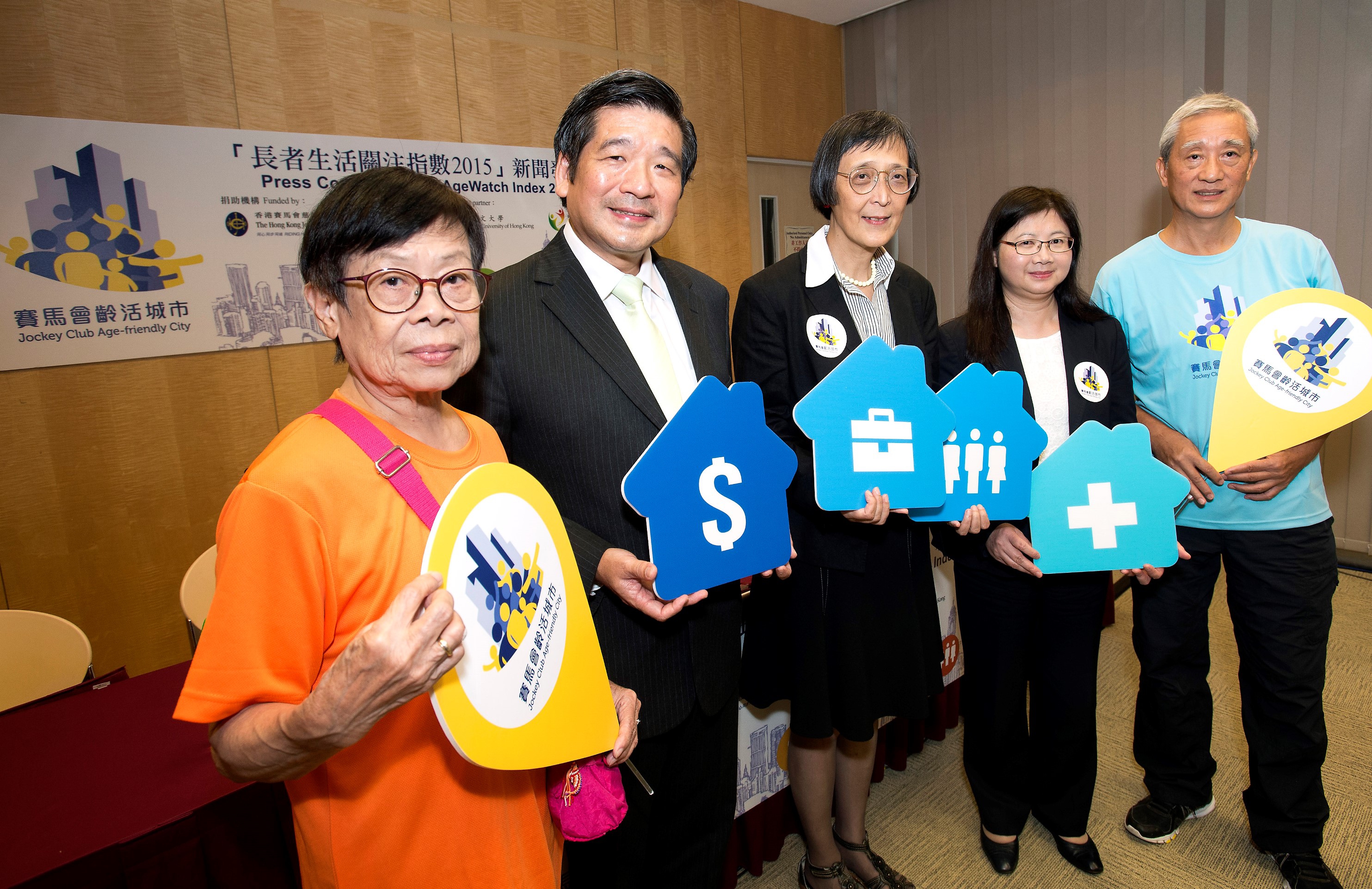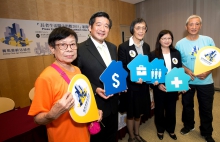CUHK
News Centre
CUHK Jockey Club Institute of Ageing Ranks Hong Kong as 19th in the World in terms of Elderly Well-being in 2015
Based on the methods used to calculate the Global AgeWatch Index which measures the well-being of older people in the world, The Chinese University Hong Kong (CUHK) Jockey Club Institute of Ageing, with support from The Hong Kong Jockey Club (HKJC) Charities Trust, found that Hong Kong ranked 19th among 97 countries or territories in 2015.
The Global AgeWatch Index is a multi-dimensional index assessing the social and economic well-being of elderly populations in over 90 countries, representing 91% of people aged 60 and above in the world. It is composed of 13 indicators which can be categorised into four key domains – income security, health status, capability and enabling environment. As a component of the Jockey Club Age-friendly City Project, CUHK Jockey Club Institute of Ageing compiled the AgeWatch Index for Hong Kong 2015 to investigate the well-being of older people in Hong Kong and its global ranking in 2015. This is the second year of the compilation of the AgeWatch Index for Hong Kong for global comparisons.
The findings suggested that Hong Kong ranked 19th among 97 countries or territories. In terms of domains, Hong Kong ranked 61st in income security, 10th in health status, 40th in capability, and 1st in enabling environment. This year’s findings are similar to last year’s: Hong Kong’s performance was outstanding in term of physical health, physical safety and access to public transport, but needed improvements in income security, mental health and social connection.
“This year’s findings restate the importance of building up older people’s social network and maintaining their mental health, as reflected in the below-average ranking of indicators of social connection and mental well-being. We are vigilant about the longer term changes in the well-being of older people in Hong Kong, especially in social connection and psychological well-being.” Prof. Jean Woo, Director of the CUHK Jockey Club Institute of Ageing commented. “We highlighted the importance of building an age-friendly Hong Kong for older people. With the support from the HKJC Charities Trust, age-friendly district based programmes will be implemented in eight pilot districts. We hope these programmes can help improve older people’s social and mental well-being.”
The HKJC Head of Charities (Grant Making – Elderly, Rehabilitation, Medical, Environment & Family), Imelda Chan said, “The Trust has long proactively supported and initiated projects aimed at improving the well-being of the elderly. We are taking a bottom-up and district based approach to build age-friendly momentum at community level, as well as shifting the public’s perception of older people, so that we can work together to build an age-friendly city.”
In order to assess the well-being of older people in Hong Kong more comprehensively, CUHK Jockey Club Institute of Ageing will develop the Hong Kong Elder Quality of Life Index. The new index is based on the four domains in the Global AgeWatch Index, with new indicators added to capture more aspects of well-being in older people. Indicators in the new index are designed according to the indicators suggested by the World Health Organization to measure the age-friendliness of cities. The baseline data of the new index will be available in 2017, using official statistics in Hong Kong and survey data collected by the Hong Kong Institute of Asia-Pacific Studies, CUHK.
The Chinese University of Hong Kong Jockey Club Institute of Ageing
In support of the University’s aspiration to overcome the challenges brought to society by the ageing population, and make Hong Kong an age-friendly city in the world, CUHK Jockey Club Institute of Ageing was established in 2014 with the generous support of The Hong Kong Jockey Club Charities Trust. The Institute will synergise research personnel and efforts across disciplines to promote and implement holistic strategies for active ageing through research, policy advice, community outreach and knowledge transfer.
(From 2nd left to 4th left) Prof. Hung WONG, Management Committee Member, the CUHK Jockey Club Institute of Ageing; Prof. Jean WOO, Director of the CUHK Jockey Club Institute of Ageing; and Ms. Imelda Chan, Head of Charities (Grant Making – Elderly, Rehabilitation, Medical, Environment & Family), HKJC.





